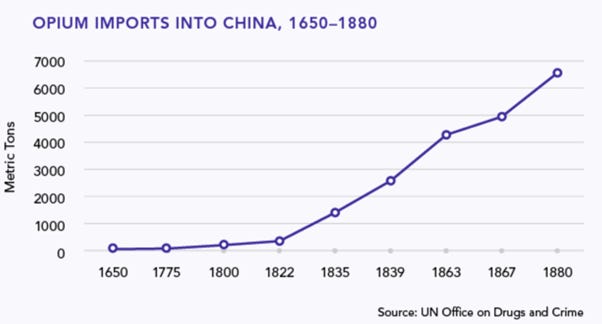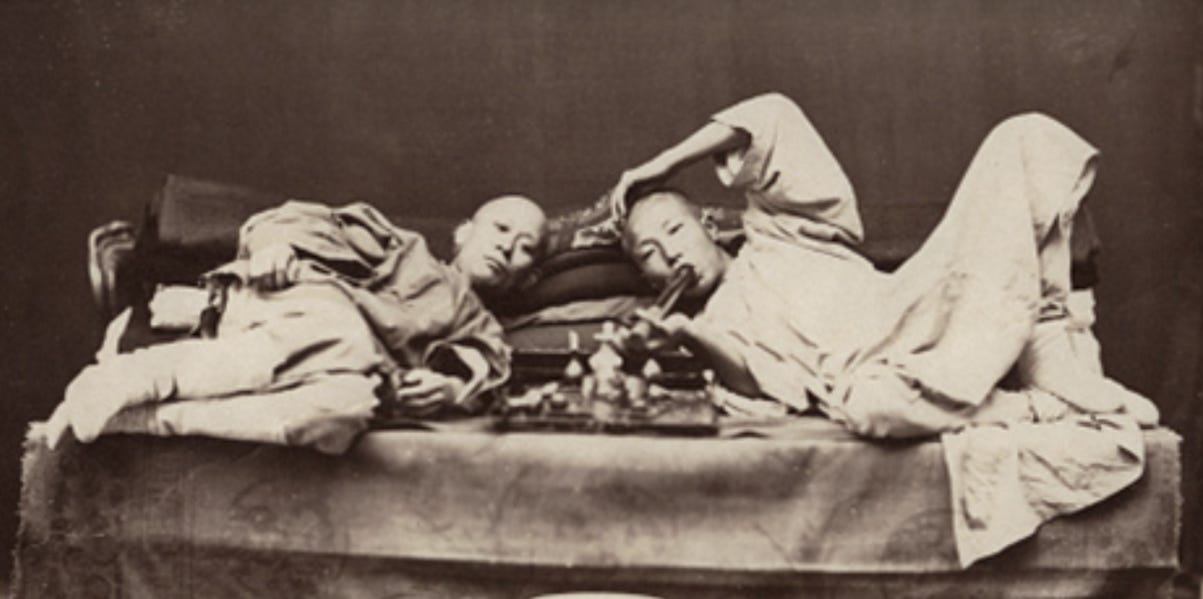The Opium / Opioid Wars
What a Little Understanding of Chinese History Can Teach US Trade Negotiators
History is important, even for economists, businessmen and trade negotiators. In the frustrating process of trying to reach a trade deal with China, it is not the “Art of the Deal” but rather the “Art of History” that US negotiators should be paying attention to.
Earlier this year, in a Hong Kong museum, I visited an exhibit on the Opium Wars. It taught me more about Chinese views on the West than it did on Great Britain’s shameful 19th century colonial exploitation. Every Chinese student is taught about the Opium Wars in school and what China has learnt from it; very few in the West could identify a single moment in their colonial past in Asia. The Opium Wars history defines how China sees the West, how they look at trade relations and how they (don’t) trust us.
Two Centuries of Self-Sufficiency
In the late 1700s and early 1800s, Great Britain had increased its trade with China, particularly with silk, tea and porcelain imports. The Chinese valued self-sufficiency and there was very little that Europeans produced that the Chinese wanted to buy, so there was soon a large trade deficit with China (sound familiar?).
The British landed on the idea of exporting opium from India to China, then an addictive drug that they had actually banned in Great Britain. To no surprise, the Chinese population had taken up the drug, with the social ills from widespread addiction, and the trade balance started to shift. The Chinese economy started to suffer from lost productivity and a shortage of silver to pay for the opium flooding the market.
The Chinese banned imports of opium in 1800 and the smoking of opium in 1813 but the British continued to illegally smuggle the contraband into China for about 30 years, with opium imports increasing ten-fold during this period. See graph below. Even the Chinese military and police were smoking opium. This is a very loose story of what transpired and I recommend you read up on the Opium Wars for the dates and volumes of drugs smuggled at the time. See an fairly concise overview here.

Two Centuries of Humiliation
The first Opium War started in 1839 when 20,000 chests of opium in British warehouses and ships were seized off the Cantonese coast and the contraband was destroyed. They also blockaded Western factories in the Canton region and arrested a large number of opium traffickers. The revenue losses from the Chinese attack on the drug trade caused outrage in Victorian England.
Without going into details of the battles (most Chinese students diligently study this history), Great Britain defeated China by 1842 and the Treaty of Nanjing (Nanking) awarded Hong Kong island to the British, while also forcing the Chinese to open more ports to trade, pay reparations and allow opium to enter the empire. This was considered as a great victory for Western imperialism as well as Christian missionaries and allowed for a deeper colonization of China.
China was not a global military power in the 19th century and did not have similar industrial and mercantile revolutions to power its economy. When the Chinese emperor died in 1850, the new emperor did not respect the first Opium War’s treaties or cooperate with the western powers. In 1856, after some skirmishes around British ships, Great Britain and France declared war on China. After four years of battles and treaties that went unratified, Western troops entered Beijing in 1860 where they looted and destroyed the Imperial Summer Palace. The Convention of Beijing further humiliated the Chinese, awarding the Kowloon peninsula to the British and opening up more ports to Western mercantilism and Christian missionaries.
The opium drug crisis forced on China continued until the first World War, marking nearly two centuries of subjugation to Western mercantile, military and diplomatic impositions.
The Residue of History
The Opium Wars was a major humiliation for China and serves to influence its leaders’ attitudes to the West today. This 5000 year empire was forced to submit to Western power that was immorally pushing drug addiction on their population (that they had banned in their own countries). At the same time, Chinese scholars are very critical of their weak leadership in controlling the epidemic. An expression taught to Chinese students from this history lesson can be translated as: “If you are backward, you will take a beating”.
How have the Opium Wars shaped modern China (especially within the context of the ongoing US-China trade negotiations)? China will no longer show weakness to the West.
If harsh US tariffs are again imposed, knowing how the Opium Wars affected Chinese history, can anyone imagine that China will cower or back down?
They will take the pain.With a centuries-long tradition of self-sufficiency, will the Chinese open up and integrate their markets with other traders?
Opium was the symbol of forced trade. It would be very difficult to force trade on China today.Will Chinese leaders feel any sympathy to the present US fentanyl crisis?
The opium crisis in China carried over into the 20th century, in some part due to Chinese administrative incompetence. We hear the same words from China today towards failures in US law enforcement.
The media today report the US trade negotiators saying they are so close to a deal and that their negotiations are successful. Some weeks then go by, and, well, nothing. Do these American dealmakers understand how the Opium Wars are a significant part of Chinese history? They will refuse to ever “take a beating” again and the United States won’t get a deal worth celebrating.
I strongly suggest that US trade negotiators take a few moments to try to understand how this humiliating past guides the present in how China sees the West. They will not bow; they will not submit to pressure or threats. When Donald Trump tries to bully China, he is not negotiating with a trade adversary, he is negotiating with a dark history.



